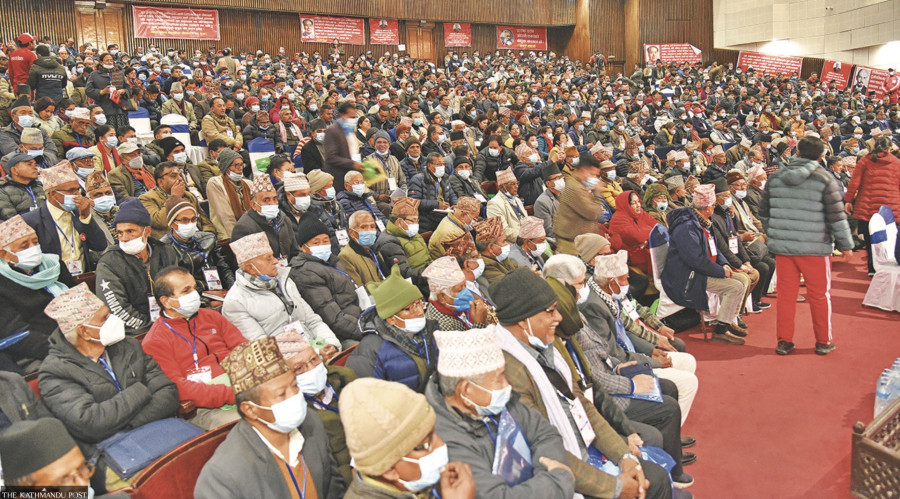Health
Experts call for urgent measures as Omicron spread risk grows
In neighbouring India, a 44 percent jump in daily cases was reported on Wednesday.
Arjun Poudel
The Tribhuvan University’s Institute of Medicine has preponed the practical classes of medical students considering the potential risk of a surge in Covid-19 cases in the near future.
With the detection of Omicron, the new variant of coronavirus, and the Delta variant already circulating in the country, the institute is wary that the field works and other practical classes could be affected in case of a sharp spike in infections.
Since practical classes cannot be conducted in a virtual setting, students will have to complete them first, officials at the institute said.
“Students of Bachelor of Public Health are currently on a field visit,” Binjawala Shrestha, an assistant professor at the institute, told the Post. “We have preponed the practical classes keeping in mind the risk of a new surge in the infection rate either by the new variant [Omicron] or the existing one [Delta].”
With the decline in new cases, schools and academic institutions throughout the country have been running in-person classes after the Dashain holidays. As the public health measures—wearing face masks, washing hands, maintaining distance have not been followed properly, doctors warn that the next epicentre of the coronavirus will be schools and colleges.
“We should be prepared for the worst,” said Shrestha, who is also a public health expert. “For that, public health measures should be enforced strictly. It is advised that schools and colleges should complete the practical classes now since they cannot be conducted virtually.”
Omicron, the new iteration of the coronavirus, is spreading across the world and in neighbouring India, which recorded at least 781 cases, with Delhi reporting 238 cases followed by Maharashtra 167.
The New Delhi government has jumped into action announcing new restrictions under the yellow alert for Covid starting Tuesday. As per the new restrictions, educational institutions will be shut, not more than 20 people will be allowed to participate in weddings and funerals, and public transport vehicles will not be allowed to carry passengers beyond half their seating capacities. Cinemas, gyms and spas will be shut. Religious shrines will remain open but devotees will not be allowed to enter, according to Indian media reports.
It has been estimated that India will be hit by a third wave after the second week of January.
According to a Hindustan Times report, India recorded a 44 percent jump in daily cases on Wednesday, which signals overall increase in Covid cases.
Nepal so far has reported three Omicron cases.
“We should not panic but authorities should be prepared to deal with a possible surge in new cases,” said Dr GD Thakur, former director at the Epidemiology and Disease Control Division. “Close monitoring of the situation is needed. For that active surveillance should be increased, border management should be made effective and simultaneously other preparations must be made.”
The Ministry of Health and Population has launched a campaign to vaccinate at least 500,000 people a day, keeping in mind the possible surge in new cases.
Public health experts say along with enforcing safety measures and increasing vaccination pace, time has also come to start preparations for keeping health facilities ready to deal with a possible surge in new cases.
“Even if the new variant of the virus doesn't make people severely sick, hospitalisation cases could still surge if hundreds of thousands of people were to get infected at once,” said Dr Keshab Deuba, an epidemiologist. “Those people with comorbidities may require oxygen and other medications.”
Nepal launched its vaccination drive on January 27 with the 1 million doses of Covishield, the AstraZeneca type vaccine manufactured by the Serum Institute of India, provided by India in grant.
More vaccines are set to arrive soon, and experts have stressed the need for ensuring that there are enough syringes to continue the vaccination campaign without any hitch.
Officials say 10 million doses of Covid-19 vaccines—6 million doses of Pfizer-BioNTech and 4 million doses of Moderna—is expected to be delivered soon. The government has purchased the doses from the US firms using the World Bank’s loan.
Nepal so far has received 39,203,927 doses of various Covid-19 vaccines—Vero Cell, AstraZeneca, Moderna, Janssen and Pfizer-BioNtech.
Estimates suggest there are 13 million doses in stock.
As of now, 10,291,090 people, or 33.9 percent of the total population, have been fully vaccinated.




 11.84°C Kathmandu
11.84°C Kathmandu















